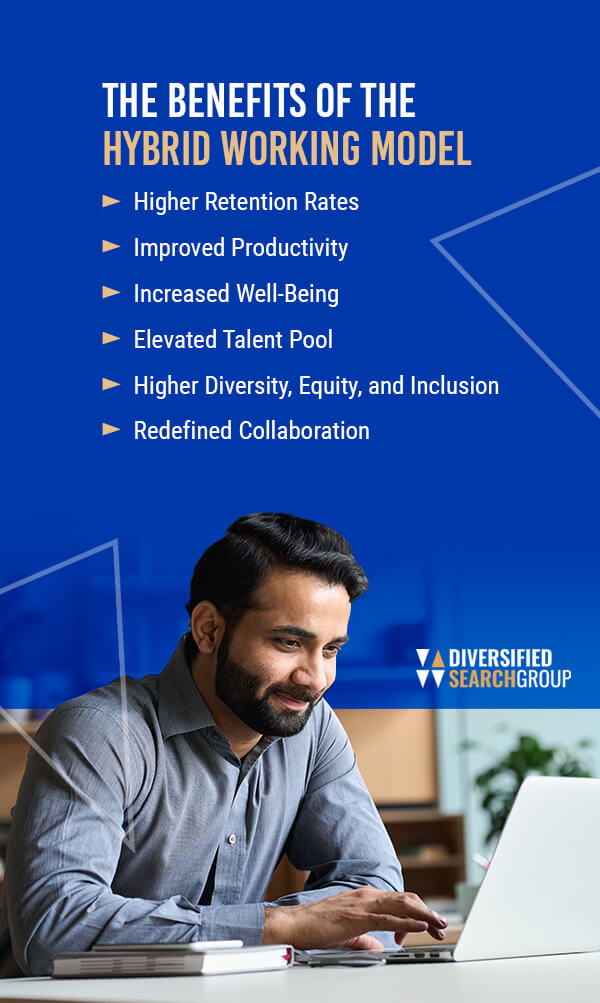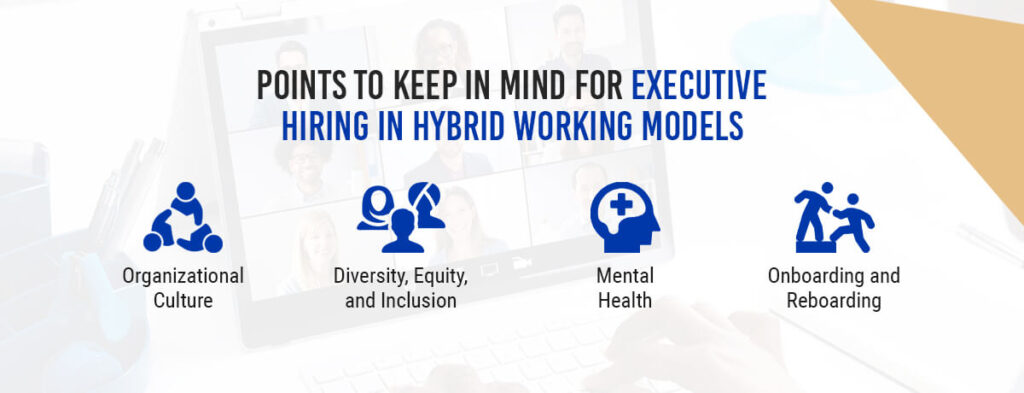
In recent years, every aspect of work — how we recruit, interview, onboard, and build organizational cultures — has undergone a fundamental shift. The hybrid workplace has risen to meet several significant workplace challenges, including work-life balance and retaining the best executive talent.
Still, hiring remote executives has its challenges, and businesses must implement strategic changes to find top candidates. Remote executive hiring means taking advantage of innovative HR strategies to ensure enterprises maintain a competitive edge in attracting top talent.
What Is Hybrid Working?
Hybrid working combines in-office and remote work to offer employees more flexibility and a better work-life balance. Employees appreciate autonomy and flexibility and are often more engaged and productive when they can work within this framework.
For executives searching for remote jobs, work-life balance is vital, as they can choose their location and working hours based on their responsibilities on a given day. They can work from home if they need to focus or meet with their teams in an office setting to collaborate and foster a sense of community.
With 59 percent of employees preferring hybrid work options, many executives will seek alternative work if a hybrid option isn’t available — 71 percent of employees say they would look elsewhere if hybrid work became unavailable as part of their current employment package. In many ways, hybrid work has become the norm.
There are four main types of hybrid work:
- Flexible hybrid work model: Employees can choose their working hours and location depending on their daily tasks, giving them complete freedom and flexibility to structure their workdays.
- Fixed hybrid work model: The organization sets a fixed schedule of the days employees will work in the office and remotely, allowing specific teams in the office on certain days.
- Office-first hybrid work model: Employees must work in the office most of the week but can work remotely a few days a week.
- Remote-first hybrid work model: Employees mostly work remotely, only getting together for the occasional team building or collaboration session. They may not need office space, so choosing a mutually accessible location for team get-togethers is essential.
No matter which model a company adopts, it is essential to adjust hiring processes accordingly.

How Does Hybrid Work Affect the Hiring Process?
Blending remote and in-office work looks different for every organization. It represents a significant change in how people work and how companies hire people. Some notable changes to the hiring process include the following:
Challenges With In-Person Hiring
The upsurge of workers in hybrid corporate positions strains jobs that rely on in-person employees. Hybrid models offer a level of flexibility that is extremely attractive to employees. The hybrid model is not universally suited to every job, and those organizations that rely on a full-time, in-person workforce are under increased pressure to fill these critical positions.
Competition for Quality Talent
With the influx of remote working options, geographical location no longer hinders the hiring process. Companies can recruit top-level executives from any number of places, even if they are across the world. Many executives themselves are looking for opportunities across the country, so it works for everyone involved.
When hiring executives remotely, businesses must make themselves appealing to employees of all levels to ensure they find the best possible candidates. Many companies demand new leadership to reinvigorate their competitive efforts in an ever-changing market, increasing the pressure to find and retain more diverse, high-quality talent.

The Benefits of the Hybrid Working Model
The hybrid working model benefits businesses and employees — companies have a happier and more productive workforce, and team members have more autonomy and a better work-life balance. Some of the top benefits of the hybrid working model include:
Higher Retention Rates
The increased flexibility and improved work-life balance associated with hybrid work attract employees for several reasons, including saving on transportation costs and having more time for family and personal health. People feel more connected in all aspects of their life when they have more control over how they spend their time, which reduces stress.
These factors increase employee retention, as executives feel an increased sense of loyalty and engagement when the company they work for seeks options to improve their lives.
Improved Productivity
Hybrid working models afford employees the opportunity for greater autonomy. As a result, they can use their time more efficiently.
For example, they can schedule complex work for when they are the most focused and productive, work during the time they used previously to commute, and create their own spaces to focus without distractions. Regarding senior executives, 56 percent reported higher productivity levels when working from home.
Business cultures that view remote work as a proactive alternative can provide teams with options suited to their work styles. Whether they thrive in the hustle and bustle of an office setting or prefer a remote work environment, they can choose the best option to increase their productivity.
Increased Well-Being
Having employees work out of the office results in less risk of illness. Suppose an employee or someone in their household is feeling unwell. In that case, they can work from home and mitigate the risk of spreading contagious diseases throughout the office.
Businesses that create a culture in which this behavior is encouraged can significantly improve the health and wellness of their workforce. Remote work options enable honest illness reporting, as employees know they will not have to use their benefit time or work without pay for minor illnesses.
Elevated Talent Pool
Making recruiting offers with hybrid and remote work options allows you to access some of the best talents in the world. You can hire people with specific skill sets that benefit your organization without geographical limitations and native language speakers.
As more people worldwide are open to remote opportunities, you can expand your business with local contacts on the ground, which is an invaluable asset to enhance your competitive position. You can hire the best people for the job and increase diversity within your workforce.
Higher Diversity, Equity, and Inclusion
As mentioned above, hiring the best people for the job without geographical limitations attracts quality people from all walks of life. Fostering diversity, equity, and inclusion (DEI) is critical as new generations enter the job market. Millennials and Gen Z professionals often avoid companies lacking diversity in their workforces, so diversity breeds diversity.
Hybrid work creates many benefits, including flexibility and a more tailored employee experience. Greater flexibility positively impacts DEI efforts, as many qualified candidates that may not be able to travel still have the option to work for the organizations of their choice.
An increase in DEI is not limited to geography, however. The hybrid working model allows people with family care responsibilities, people with disabilities, and people facing economic housing limitations more ways to be employed, which is not always possible in the traditional working model.
Redefined Collaboration
Collaborative efforts are as important for hybrid working models as they are in the office. Hybrid working models provide ample learning opportunities for all levels of an organization as people adjust to the new work norms, such as the digital transformation required to unite and engage team members.
Executives and their teams no longer need face-to-face meetings to brainstorm and innovate. They can leverage modern technology to create unique forms of collaboration suited to each individual, each team, and the organization as a whole.

Points to Keep in Mind for Executive Hiring in Hybrid Working Models
Hiring remote executives can be challenging. Businesses and employees have different expectations within the hybrid work model, and many HR directors and leadership teams are new to hybrid hiring. Keep the following in mind when embracing hybrid working as part of your business culture:
Organizational Culture
Leadership must redesign strategies to enhance organizational culture. Fostering a solid corporate culture requires more attention when employees are based in different work environments and parts of the world. Hiring for a cultural fit within your organization is more important than it used to be.
Leaders must rethink what they use office space for and which teams should be in the office and when. They must also allocate appropriate resources to execute these strategies, including robust onboarding and training processes.
Striking the right cultural balance in your organization begins with a culture of open and honest communication with employees. Every team member should be comfortable sharing open and honest feedback. Leadership and executives must address employee feedback and proactively create policies that support hybrid employee needs.
Diversity, Equity, and Inclusion
Offering hybrid work is an excellent way to recruit executives from different socioeconomic backgrounds. It promotes inclusivity by making positions available to people with diverse needs and allowing them to manage their work arrangements in line with their unique situations.
Employees must have autonomy in deciding what criteria enable them to perform optimally. Designing flexible roles helps them achieve their sense of balance.
For hybrid work to support diversity, organizations must adopt a consistent and equitable policy regarding who can work in the home and office settings. Regardless of employees’ locations, they must also create collaborative spaces where executives and other team members can create and maintain robust working relationships.
Mental Health
Hybrid work has many benefits for employees’ mental health, but significant drawbacks still exist. Employees working from home may find it challenging to create clear boundaries when working and living in the same space, which can lead to burnout.
Prioritizing employee mental health is essential for all businesses, and each organization has a different strategy. Many companies have mental health resources available for their teams or require team members to take a certain amount of leave each year. While policies and mental health days are a fantastic way of combatting work-related stress, embracing a shift in mindset is equally important when hiring in a hybrid framework.
Stigma and misunderstandings about mental health challenges still exist, and management must foster open communication surrounding mental health to combat them. Executives and business leaders must be honest about mental health to create a supportive team environment. When hiring in a hybrid work model, ensuring management and executives have the tools to deal with mental health challenges is critical.
Onboarding and Reboarding
The hybrid approach to recruitment necessitates in-person and virtual interviews, depending on candidates’ locations. As hybrid recruitment has become increasingly competitive, prospective employers be proactive when engaging and building relationships with strong candidates.
Taking a proactive approach to engagement could involve a strategy for introducing your organization to candidates and conducting meaningful interviews. For hybrid or remote candidates to have access to all the information, equipment, and contacts necessary to support their new roles, companies should have a robust onboarding process.
How to Beat Your Competition When Hiring
Businesses in all industries compete for top talent. Hiring the best executives helps your company maintain a competitive position, and attracting the best talent takes work. A unique and attractive approach is a cornerstone to attracting and retaining top executive talent in your organization.
Like all critical processes, partnering with global leaders in recruitment will help your business to sustain a competitive edge. Working with one of America’s best executive recruiting firms is a sound strategy for winning an extremely competitive talent war. Diversified Search Group will pioneer your executive talent search for you, ensuring you can find and hire the best talent available, even in often complex remote or hybrid work environments.
Recruit the Best Quality Executives
With Diversified Search Group
Recruit the Best Quality Executives With Diversified Search Group
Your business needs innovative and transformative leadership to stay competitive. Diversified Search Group is one of the country’s top executive search firms, making us equipped to hire remote executives for a wide range of businesses and industries.
Our executive search experts are here to help you realize your purpose, achieve progress, and drive performance in your organization by attracting and recruiting inspiring and proactive leaders from every background. Contact us to learn more about how partnering with us can help you cultivate leadership for your company.